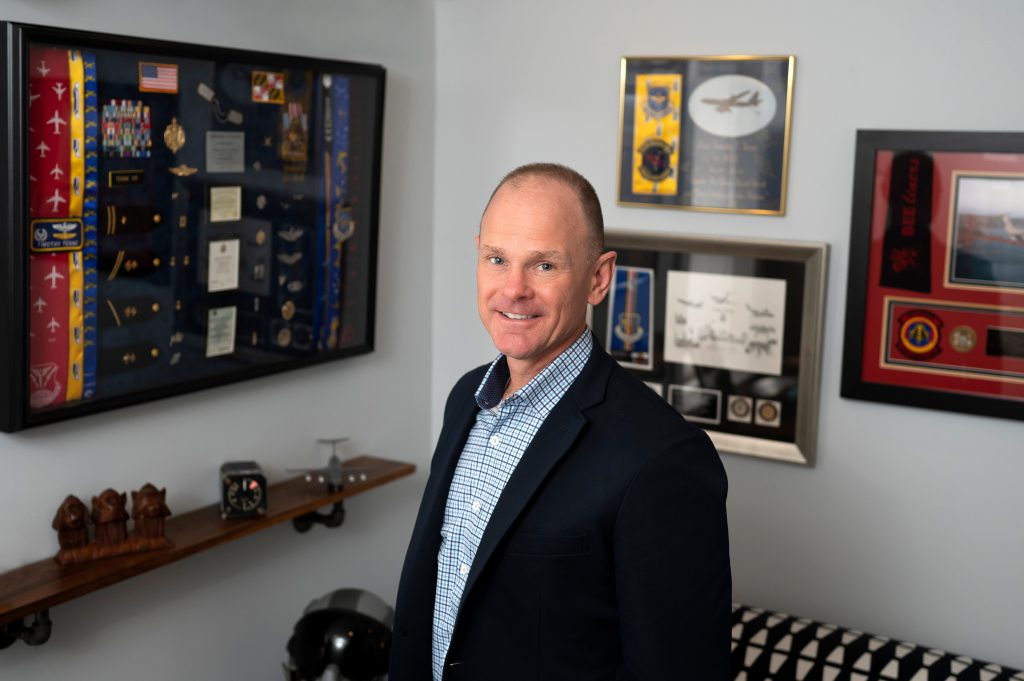By Adam Stone

A mentor once taught Timothy Tenne, J.D. ’19, the “yellow sticky” test. Give three people a yellow sticky and ask them what’s most important about it.
The pilot, thinking functionally, will merely note that it sticks. The engineer might describe the chemical makeup. The lawyer will come at it from a completely different angle. “That person will explain how it came about. They’ll give you everything from the liability to the contract that was used to buy the thing,” Tenne says.
Despite a ridiculously well-rounded CV, Tenne was missing that crucial point of view. And so he went back to school at the age of 47, earning his J.D. from UBalt Law in 2019. Today, as the newly hired CEO of the North American market for Nordic Unmanned, a Norwegian autonomous-drone manufacturing company, he’s putting that legal education to work.
A renaissance man
It’s fair to call Tenne a renaissance man. He graduated from the U.S. Naval Academy and served for 20 years in the Air Force. Along the way he picked up three (yes, three) master’s degrees, from George Washington University (organizational management); Webster University (an MBA in business administration) and from the U.S. Air Force Air Command and Staff College (master’s with a focus on strategy and international relations).
His professional and personal activities are similarly diverse. In addition to helping Nordic Unmanned expand its market in North America, Towson-based Tenne is also founder of T3 Ideas, where he serves as a consultant to the aviation industry. And he’s a certified flight instructor.
Tenne is busy outside the office too. He volunteers as a “Blue and Gold Officer” at the Naval Academy — a cadre of graduates who help to vet incoming candidates. “I consider that one of my top honors,” he says. “The Academy gets about 40,000 applications for 1,200 spots, and that Blue and Gold interview can really push you over the top with the admissions board.”
A competitive runner, he also has a side business organizing running-community events, like the annual Annapolis Run for the Lighthouse half-marathon, benefiting the homeless. “Most of the companies that put on running events are event planners, but that’s just one aspect,” Tenne says. “In a running event, the timing of everything has to be perfect. As a runner myself, I understand the importance of paying attention to the details.”
UBalt Law alumna Lisa Sparks, J.D. ’07, has helped Tenne in his running-event business. “So many lawyers are runners, and it makes sense: it’s a competitive, self-reliant sport,” she says. “After getting to know me as his professor and learning that I was a runner, Tim thought I’d be a good fit for race timing — and he was right.
“Timing and managing a race is a lot like trying a case: the prep is more than the event itself, you’re on alert with high adrenaline the whole time, and there is a lot of thinking on your feet and dealing with issues as they arise.
“Tim’s a classic UB evening student,” she says, “successfully marrying his legal education with a lifetime of work experience to upgrade his career path.”
With all that under his belt, Tenne has turned his attention lately to the legal aspects of unmanned-aerial operations. He’s known as one of the founding voices in the effort to promulgate drone regulations.
The regulatory landscape
Before joining Nordic Unmanned in August, Tenne was COO of Easy Aerial, which makes commercial and military-grade unmanned aerial vehicles, or UAVs, that can effectively fly themselves. In that role, he learned that present-day regulation presents all kinds of hurdles.
“The regulations right now say that you have to have a human operator for your drone, and a human visual observer to look and see your drone while you’re operating it,” he says. Under current regulations, full autonomy is not possible.
With his law degree in hand, Tenne is working to help shift that regulatory landscape, advocating for change through his involvement in FAA working groups as they go through the public rulemaking process. He is also teaching a new course in Drone Law this spring at UBalt Law.
“The FAA has the aviation rulemaking committee, which operates under a very unique federal-agency mandate. Congressional authorization allows FAA to partner with industry at the onset to create new regulation, which is great,” he says. For example, collaborative efforts led FAA to authorize commercial drone operations for small unmanned systems, below 55 pounds, relatively quickly.
“Right now, the FAA is meeting on what the new rules are going to be for operations beyond visual line of sight, so that we can get true autonomy,” Tenne says.
His experience has taken him deep inside the mechanics of government regulation, giving him insight that he says could be applicable to attorneys in a range of regulated areas — from transportation to pharmaceuticals to the environment.
His advice? “The American Bar Association has a committee called regulatory administrative law. That would be my first stop,” he says. “Then there are 50 to 100 subcommittees underneath that. Those are great places where subject matter experts come together to collaborate and to help advocate. For a young attorney coming out of law school, that’s a great place to start building your experience.”
Adam Stone is a writer based in Annapolis.
